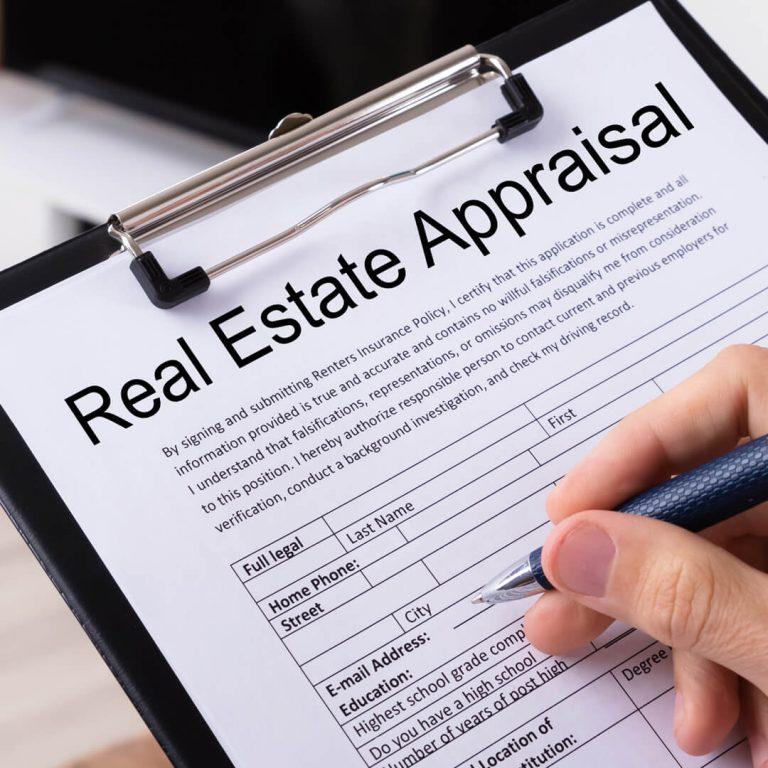A residential real estate appraisal, or home appraisal, is a process to determine a home’s current value. It serves an important purpose whenever a home is being used as collateral for a loan.
Namely, an appraisal is needed to determine a borrower’s loan-to-value (LTV) ratio (the loan amount divided by the home’s current market value). This is a key factor in how a lender assesses the riskiness of a loan. The lower the LTV, the easier it is to get approved and qualify for the best interest rates, assuming other risk factors like your debt-to-income (DTI) ratio and credit score are above average.
Who conducts the home appraisal and what’s involved?
Home appraisals are performed by a real estate appraiser who is either licensed or certified, depending on your state’s rules. The lender hires the appraiser who contacts the current homeowner to arrange a time to walk the interior and exterior of the property to conduct the following tasks:
- Confirm the home’s square footage and lot size
- Determine its floor plan, including the number of bedrooms and bathrooms and the existence of things like a basement, attic or garage
- Assess the home’s overall condition and appearance
- Look for visible signs of damage from things like water or pest infestation
- Check that the home’s major systems (e.g., HVAC, electrical, and plumbing) are working
- Note the existence and extent of any renovations or other home improvements
- Examine the appearance and condition of the surrounding neighborhood
Next, the appraiser looks for several homes nearby that are comparable in size and floorplan, which have sold recently, typically within the last 12 months. After comparing the condition of those homes to the one in question, the appraiser determines its value based on the selling prices of those comparable properties (comps).
Then the appraiser writes a report that includes their appraised value for and a description of the home with photos, along with relevant information about and exterior photos of the comps to back up that valuation. They deliver the appraisal to the lender who is required by law to share it with the borrower.
How much does an appraisal cost and who pays for it?
The average appraisal costs between $500 and $1000, depending on the size and location of the home and the amount of research required to complete it. As you might expect, the larger the home, the more expensive the appraisal.
The buyer is responsible for the appraisal fee, which is paid upfront rather than at closing. In some cases, the buyer can negotiate with the seller to pay for the appraisal. This is more likely in a buyer’s market in which sellers are willing to offset some of the buyer’s cost to increase their chance of selling. Your realtor can help you determine if this request is worth including in your offer.
When do lenders require an appraisal?
Anytime you apply for a loan or line of credit that is being secured by a home, expect the lender to require an appraisal. This includes the following:
Lenders need the appraisal to determine LTV to make sure you’re not borrowing more money than the property is worth or coming too close to its value—a scenario lenders deem as putting you at greater risk of default, i.e., not repaying your loan as agreed.
For a new or refinanced mortgage, most lenders consider an LTV above 80% as high, or riskier. If approved, a borrower with an LTV over 80% has to get private mortgage insurance (PMI) for a conventional mortgage, or else put down a larger down payment to reduce the LTV.
For example, if you request a $425,000 conventional mortgage on a home appraised at $500,000, your LTV is 85% ($425,000/$500,000), and PMI is required. But if you put down $100,000 in the same scenario, then your LTV is 80% ($400,000/$500,000), and PMI isn’t required.
With a HELOC or home equity loan, lenders calculate your combined loan-to-value (CLTV) ratio, which just means they add any existing mortgage balances to the amount of money you want to borrow to calculate your total LTV. Maximum CLTVs vary by lender but are typically around 85% (Quorum allows up to 90% CLTV with their Interest-Only HELOCs.)
Is a home inspection the same as an appraisal?
A home inspection is different than an appraisal, although both are part of the process of buying a home with a mortgage. The former takes a closer look at the property than the latter to protect you from buying a home with major defects.
For example, unless the roof is visibly leaking or the HVAC system doesn’t appear to be working during an appraisal, the appraiser might not discover these problems. But an inspector spends more time looking for such things so they can produce a report that requires that any major defects be fixed before the sale is completed at closing. Their report also identifies more minor issues recommended for repair.
Between an appraisal and a home inspection, both you and your lender fully understand the value and condition of a home being bought and used as collateral. As for refinances, HELOCs and home equity loans, official home inspections aren’t needed, only appraisals.







Comments Section
Please note: Comments are not monitored for member servicing inquiries and will not be published. If you have a question or comment about a Quorum product or account, please visit quorumfcu.org to submit a query with our Member Service Team. Thank you.